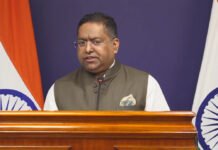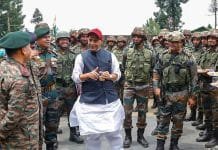INVC NEWS
New Delhi – The diplomatic tensions between India and Canada have significantly escalated following the assassination of Hardeep Singh Nijjar, a designated terrorist by India, who was killed on Canadian soil. Amid this crisis, India has issued a strong message to the Canadian government, demanding solid evidence related to the murder of Nijjar. Additionally, India is urging Canada to take more decisive action against Khalistani extremists operating within its borders. This article delves into the key issues driving this standoff and the implications for both nations.
India’s Firm Stance on Nijjar’s Murder
India has expressed its clear dissatisfaction with the accusations levied by Canadian Prime Minister Justin Trudeau, which imply Indian involvement in Nijjar’s killing. The Modi government has labeled these claims as “baseless” and has called on Canada to provide tangible proof to substantiate their allegations. India has made it clear that without credible evidence, Trudeau’s accusations amount to little more than political maneuvering.
Furthermore, India is urging Canada to refrain from politicizing its investigative agencies for electoral gains, as the upcoming elections in Canada could further inflame tensions.
The Khalistani Factor: A Point of Contention
One of the most contentious issues in the strained relationship between the two nations is the presence of Khalistani elements in Canada. India has repeatedly voiced its concerns over Canada’s failure to curb the activities of pro-Khalistan groups that advocate for the secession of Punjab from India. The Khalistani movement, which seeks to create a separate Sikh state, has been a thorn in India’s side for decades.
A History of Tensions
India officially declared Hardeep Singh Nijjar a terrorist in 2020 due to his involvement in promoting separatist activities. His death in June 2023 only exacerbated tensions between the two nations, with Prime Minister Trudeau accusing India of involvement in the murder. However, the Indian government swiftly dismissed these claims, calling them “absurd.”
India’s longstanding grievance is rooted in the fact that Canada has allowed its territory to be used by Khalistani sympathizers who actively engage in anti-India propaganda. Despite numerous diplomatic efforts, including meetings between Indian Prime Minister Narendra Modi and Trudeau, Canada’s apparent inaction on these groups has continued to be a sticking point.
Diplomatic Fallout and Geopolitical Implications
The Nijjar assassination and subsequent accusations have brought India-Canada relations to their lowest point in years. Beyond the immediate diplomatic fallout, this standoff has significant geopolitical implications. Canada’s stance on the issue, particularly in the context of its growing Sikh diaspora, is influenced by domestic politics, where the Khalistani vote could sway election results. On the other hand, India sees Canada’s tolerance of Khalistani extremism as a threat to its national security and sovereignty.
















